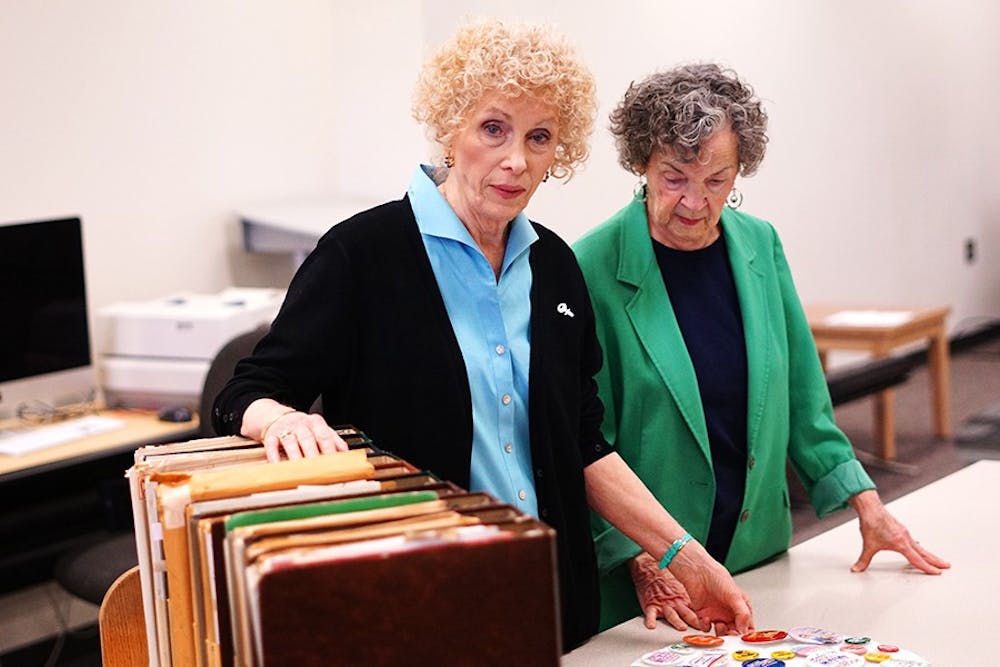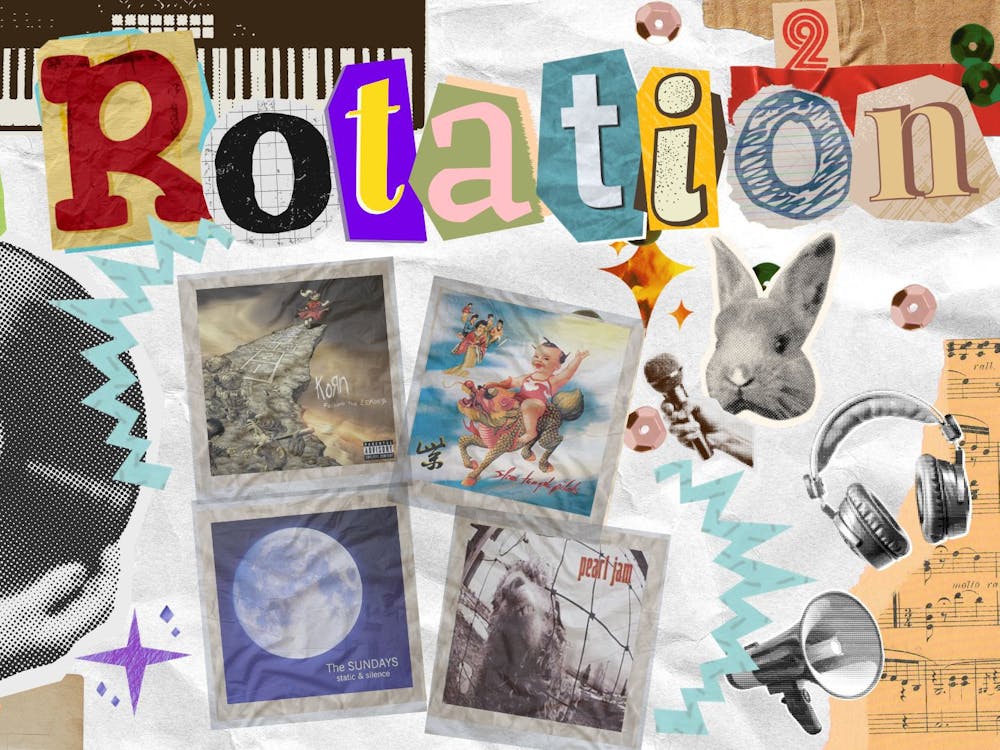Anyone interested in the feminist movement doesn’t have to go very far to find real pieces of its history. They just need to look in the Miami University Library’s new digital archives.
From Fantastic Feminist dolls, to brochures and radio recordings, small pieces of the movement have been digitally scanned and preserved for the public’s use by senior Women and Gender Studies students.
But each of these artifacts come with a back story, known for the most part only by two crucial figures in the women’s movement of Butler county.
“Everyone get out his pen”
Sitting in her second grade classroom, Joanne McQueen first questioned why she wasn’t as important as the boys in her class.
“Every time they ask me to tell that story, I feel emotional,” she said. She paused, placed her phone on the table and took a deep breath, looking up. “After all these years.”
In that classroom, one afternoon the teacher told “everyone to get out his paper and pencil.”
“She said everyone — that meant me — but I clearly wasn’t a boy, so I was confused by that,” said McQueen. When her teacher asked why she looked so confused, McQueen told her just that. The teacher then made a class announcement, stating that whenever she said ‘his,’ it meant ‘everyone’ and it included the girls.
That didn’t quite sit right with McQueen, who went home and asked her mother why this was so.
“I don’t know, Joanne,” her mother answered. “That’s just the way it is.”
“And I said, ‘Mom why couldn’t it have been different?’” she remembered.
She still never accepted that answer. It bothered her years later because she was in a small town and her position was seen as radical.
Enjoy what you're reading?
Signup for our newsletter
“I don’t like that because I know I’m right,” McQueen said, “Because I can feel it.”
At her first national National Organization for Women (NOW) conference in Washington D.C., her eyes caught onto a woman in a business suit — a rarity at the time. She was carrying a briefcase, something that McQueen had never seen a woman carry before. Slapped proudly on the side was a bumper sticker that said “I am proud to be a feminist.”
“I wanted that feeling,” said McQueen. “I wanted to be proud that I was a feminist.”
So she set out to design Fantastic Feminist, a doll that was proud of being a woman, and a feminist.
Designed purposefully with short curly hair like McQueen’s, the doll had unaccentuated breasts and thicker thighs. “I wanted her to look like an ordinary woman, an ordinary woman is a fantastic woman,” she said.
She produced mail order catalogs, with a variety of occupational options for the doll, based on leading women of the time — an astronaut modeled after Sally Ride, the first female in space, and an IndyCar driver based on Janet Guthrie, the first female to qualify for the Indianapolis 500.
One of the most important dolls to McQueen is the doctor. When she started showing young girls at her shop table photos of a woman with a red cross on her jacket, almost all of them called her a nurse.
“Fast forward — with my six-year-old great niece I play the same game,” said McQueen. “And she says ‘doctor.’”
The doll was featured in Ms. Magazine on its annual list of non-sexist toys released before Christmas.
“She’s one of the few things that I copyrighted,” said McQueen. “I’m real proud of her.”
Anti-war woman
Kathy McMahon-Klosterman was thinking about being a lawyer. After earning her undergraduate degree at an all-women’s college, she traveled to Brown University to take her LSAT along with about 250 other students. On that Saturday morning, only seven or eight women sat for the test.
It was 1968, and in the midst of the Vietnam War young men could achieve draft deferment by attending college. Meanwhile McMahon-Klosterman was participating in anti-war marches.
While waiting in line, four men approached her and said, “Do you understand if you take these boards, and you get into law school, you might take my seat? And if you take my seat, then I’m going to Vietnam. I want you to understand that if you take my seat in law school that I could’ve had, and I go to Vietnam and I get killed, that my blood is on your hands.”
She never attended law school, though she was accepted to several. Instead she attended graduate school for education.
“I didn’t think about that for about 30 years,” she said. “But in reflection, I wonder how much influence that had.”
Heavily involved in the anti-war efforts, she was bothered by the different responsibilities delegated to the men and women.
“It seemed that women could do a lot of work, and yet we are still taking the back seats,” she said, going on to explain that the men would strategize and plan while the women would be left to make posters. “That doesn’t seem right.”
Since the two met at a NOW meeting of Butler County in Hamilton, they have been in constant contact and have been active in advancing the feminist movement in Oxford and throughout the county.
“Women About Women," McMahon-Klosterman’s radio program simply wanted to start the conversation about women’s lives in their society. It was a live call-in radio show for women to talk about women. Intended to simply raise women’s awareness about who they are and how they are positioned in society, it was often criticized as being solely about “male bashing.”
“My standard response is: no, you actually don’t come up very much,” she said, laughing. “We have far more important things to talk about.”
The two women organized the first Take Back the Night March at Miami, an event held annually to eradicate sexual violence and support assault survivors.
“Imagine taking back the night,” said McQueen, “I hadn’t realized that I and other women were afraid to walk in the dark at night. . .sad to say, they still have to have it today, all these years later.”
Through the years McQueen kept things from their efforts: Newspaper clippings, letters, photos, brochures and more. What began as a sort of scrapbook now carries historical value to the Butler County area and national women’s movement alike.
“What we realized as we began to do that... as we went through the albums is that there is a backstory to much of what was in the albums that doesn’t exist anywhere but our heads,” said McMahon-Klosterman.
She cited one major example of this kind of lost backstory. The pair were some of the very first trained rape crisis counselors in the Butler county area, helping women from the time of the assault, to the hospital, and throughout the legal process should they have chosen to press charges.
After following women through this process, the rape crisis counselors noticed that
whenever the assaulted women ended up on a particular judge’s docket, they were re-victimized and put under traumatizing duress his courtroom.
So, they decided to do something about it — from that time on, every time an assaulted women entered his courtroom, she wasn’t alone.
When such a case arose, a group of four to 13 women would accompany the victim into the courtroom, sitting in the back with a pad of paper and a pencil. Every time the judge spoke, no matter what he was saying, they would write furiously on their paper.
“Sometimes we weren’t even writing words,” said McMahon-Klosterman.
The group unnerved the judge, who repeatedly asked them what they were doing. Without receiving an explanation, he realized that the women only wrote when he spoke. He began to speak more carefully.
“I don’t know that we changed his beliefs at all, but we changed his behavior,” said McMahon-Klosterman. “He stopped re-victimizing women in his court room.”
While this story and its impact are significant, and methods like this one can teach today’s feminists new ways of getting their points across, it’s represented in the album by one small newspaper clipping about the judge. Without speaking to McMahon-Klosterman and McQueen, readers wouldn’t know who he was or how he treated women in his courtroom.
Many of the women that created such a big impact, and know these stories won’t be around to share them much longer. McMahon-Klosterman is 76, and McQueen is 69.
“And we’re the young ones,” said McMahon-Klosterman. “This history will be lost.”
Digitizing history
McQueen promised to donate these albums and memorabilia to a local library, but in an effort to share these archives with as many people as possible the duo worked with the Women and Gender Studies capstone during the fall semester to digitally archive their memories. Students in the capstone were responsible for digitizing pieces of McQueen’s collection for the digital archives.
This spring semester, two students enrolled in an independent study to continue working with the archives by creating a website to showcase them.
Jane Winsett, a senior in the WGS capstone and a member of the independent study, worked with McMahon-Klosterman and McQueen. Being able to see what was current news at the time helped her realize the span of the movement itself, especially on Miami’s campus.
Winsett recognized, through working with artifacts such as old Miami Student documents, that some things “really haven’t changed at all, which is disappointing.”
Ann Fuehrer, associate professor of Women and Gender Studies, teaches the capstone course. Next fall the same course will be offered — this time, students will be able to create digital exhibits with the digitized memorabilia.
“I think it’s important to know something about the history of, well, everything — but especially the feminist movement,” she said.
Winsett found inspiration in working with the two accomplished women: “It’s been encouraging to see that activism doesn’t end at any point in your life, if you don’t want it to.”
McMahon-Klosterman has mixed feelings about the feminists of today, however.
“The young generation can understand the work that came before them,” she said. “Many of the women feel that the work has been done, that there’s no more work to do. And that’s dangerous. Sexism is alive and well.
“Even presidential candidates are excused from assaulting, because they are rich, white men,” she added.
Despite these setbacks and changes, the women’s movement of today works toward the same goal as McMahon-Klosterman and McQueen.
“[The goal] is the same as it’s always been, to have a world that’s less about hierarchy and competition, and fear and power and money, and more about quality of life, equality and fulfilling relationships and wellbeing,” said Fuehrer. “I don’t think those basic goals have changed.”




